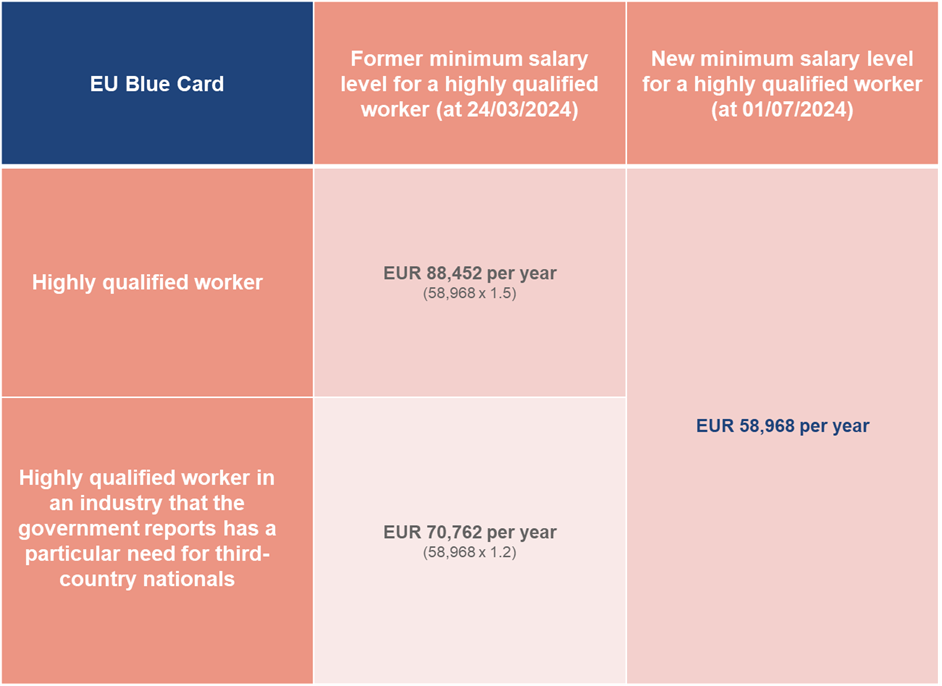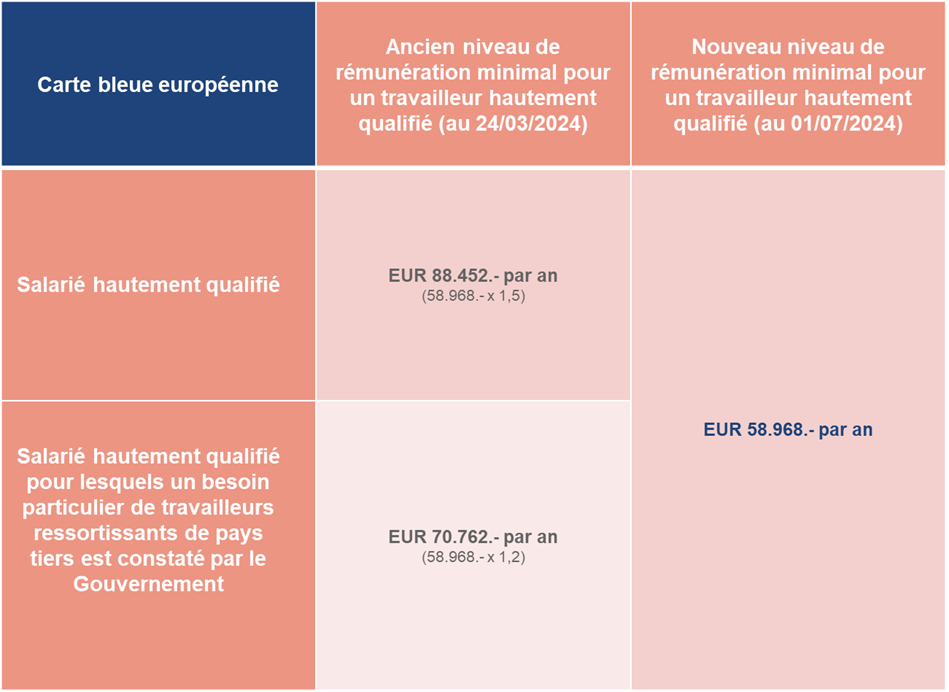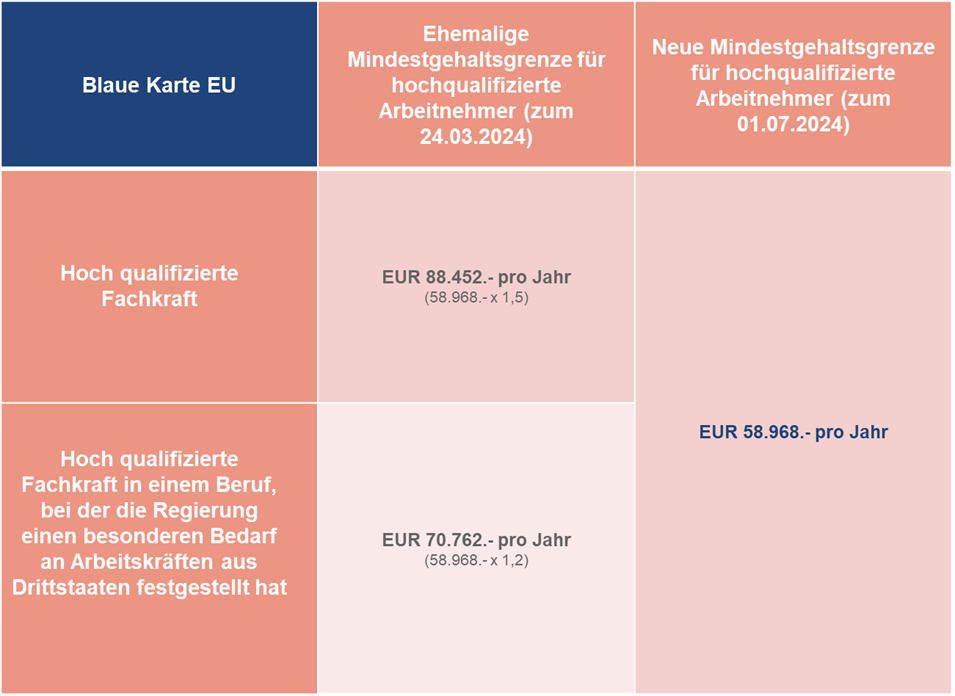EU Blue Card: significant drop in thresholds for minimum salary
The minimum annual salary needed to hire highly qualified third-country workers in Luxembourg was significantly reduced on 1 July 2024.
The law of 4 June 2024 [1] simplified and improved the conditions of residence for highly qualified third-country workers who want to move to Luxembourg for work under an EU Blue Card (see our Newsflash from 1 July 2024).
In line with this law, and to also attract more foreign talent to Luxembourg (while guaranteeing the implementation of Directive (EU) 2021/1883 [2] on the conditions of entry and residence of third-country nationals for the purpose of highly qualified employment), Luxembourg has significantly reduced the required minimum salary level for these workers to be able to obtain an EU Blue Card in Luxembourg (as a reminder, this salary level had recently been increased – see our Newsflash of 25/03/2024).
The Grand Ducal regulation of 20 June 2024, [3] published on 27 June 2024, (the Regulation) stipulates that the threshold for minimum salary now cannot be lower than the gross average annual salary, which is currently set at EUR 58,968 by the Ministerial regulation of 15 March 2024 [4].
Therefore, there is no longer a distinction between employment industries for highly qualified workers and the two previous thresholds of 1.2 and 1.5 times the gross average annual salary have been abolished.
The new thresholds are as follows:

In addition to this level of remuneration, to be considered as a highly qualified worker, the third-country national must have an employment contract with a minimum duration of six months and must either have the higher professional skills required to exercise their non-regulated profession or fulfil the conditions required to exercise a regulated profession, as detailed in the employment contract.
The Regulation also specifies that when the Ministry of Immigration carries out an evaluation on whether the holder of the EU Blue Card has sufficient personal finances for the purposes of withdrawal of or refusal to renew the EU Blue Card, they must also take into account the potential contributions of the applicant’s family members to household income.
These new thresholds and the provisions on the evaluation of a highly qualified worker’s personal finances are applicable from 1 July 2024.
Author: Raphaëlle Carpentier
[1] Law of 4 June 2024 amending the amended law of 29 August 2008 on the free movement of persons and immigration.
[2] Directive (EU) 2021/1883 of the European Parliament and of the Council of 20 October 2021 on the conditions of entry and residence of third-country nationals for the purpose of highly qualified employment, and repealing Council Directive 2009/50/EC.
[3] Grand Ducal regulation of 20 June 2024 amending:
1° the Grand Ducal regulation of 5 September 2008 defining the criteria for financial resources and accommodation provided for by the law of 29 August 2008 on the free movement of persons and immigration;
2° the Grand Ducal regulation of 5 September 2008 implementing certain provisions concerning the administrative formalities provided for by the law of 29 August 2008 on the free movement of persons and immigration;
3° the Grand Ducal regulation of 26 September 2008 determining the minimum salary level for a highly qualified worker by implementing the law of 29 August 2008 on the free movement of persons and immigration.
[4] Ministerial regulation of 15 March 2024 setting the average gross annual salary as defined by the Grand Ducal regulation of 26 September 2008 determining the minimum salary level for a highly qualified worker by implementing the law of 29 August 2008 on the free movement of persons and immigration.

How we can help
Get in touch with our Employment Law, Pensions & Benefits team for tailored advice on how these changes may affect your recruitment and immigration strategy or for any help with regard to recruiting third-country nationals.
Carte bleue européenne : Baisse significative des seuils de rémunération minimaux
Le montant de la rémunération annuelle minimum nécessaire pour embaucher des travailleurs hautement qualifiés ressortissants de pays tiers au Luxembourg a été diminué de manière significative au 1er juillet 2024.
La loi du 4 juin 2024 [1] a simplifié et amélioré les conditions de séjour des travailleurs hautement qualifiés ressortissants de pays tiers souhaitant venir travailler au Luxembourg sous l’égide d’une « Carte bleue européenne » (voir notre Newsflash du 1er juillet 2024).
Dans la lignée de cette loi, et pour attirer davantage de talents étrangers au Luxembourg (tout en garantissant la transposition de la directive (UE) 2021/1883 [2] établissant les conditions d’entrée et de séjour des ressortissants de pays tiers aux fins d’un emploi hautement qualifié), le législateur luxembourgeois a significativement réduit le niveau de rémunération minimum requis pour que ces travailleurs puissent obtenir une carte bleue européenne au Luxembourg (pour rappel, ce niveau de rémunération avait été augmenté récemment – voir notre Newsflash du 25/03/2024).
Le règlement grand-ducal du 20 juin 2024 [3], publié le 27 juin 2024 (le « Règlement »), stipule que le seuil de rémunération minimale ne peut désormais pas être inférieur à un seuil salarial égal au salaire annuel brut moyen, fixé actuellement à 58.968.- EUR par le règlement ministériel du 15 mars 2024 [4].
Il n’y a donc plus de distinction selon le secteur d’activité des travailleurs hautement qualifiés et les deux seuils de 1,2 et de 1,5 x le salaire annuel brut moyen qui existaient auparavant sont abolis.
Les nouveaux seuils sont donc les suivants :

Outre, ce niveau de rémunération, pour être considéré comme travailleur hautement qualifié, le ressortissant de pays tiers doit être en possession d’un contrat de travail d’une durée minimale de six mois et il doit posséder les qualifications professionnelles élevées requises pour exercer la profession non réglementée, ou satisfaire aux conditions requises pour l’exercice de la profession réglementée, telle que mentionnée dans le contrat de travail.
Le Règlement précise également que lorsque le Ministre ayant l’immigration dans ses attributions procède à l’évaluation du caractère suffisant des ressources personnelles du titulaire d’une carte bleue européenne aux fins de son retrait ou de son non-renouvellement, il doit également prendre en compte les contributions éventuelles des membres de la famille de l’intéressé aux revenus du ménage.
Ces nouveaux seuils ainsi que les dispositions concernant l’appréciation des ressources personnelles du travailleur hautement qualifié sont applicables à compter du 1er juillet 2024.
Author: Raphaëlle Carpentier
[1] Loi du 4 juin 2024 portant modification de la loi modifiée du 29 août 2008 sur la libre circulation des personnes et l’immigration.
[2] Directive (UE) 2021/1883 du Parlement européen et du Conseil du 20 octobre 2021 établissant les conditions d’entrée et de séjour des ressortissants de pays tiers aux fins d’un emploi hautement qualifié, et abrogeant la directive 2009/50/CE du Conseil.
[3] Règlement grand-ducal du 20 juin 2024 portant modification :
1°du règlement grand-ducal modifié du 5 septembre 2008 définissant les critères de ressources et de logement prévus par la loi du 29 août 2008 sur la libre circulation des personnes et l’immigration ;
2°du règlement grand-ducal modifié du 5 septembre 2008 portant exécution de certaines dispositions relatives aux formalités administratives prévues par la loi du 29 août 2008 sur la libre circulation des personnes et l’immigration ;
3°du règlement grand-ducal modifié du 26 septembre 2008 déterminant le niveau de rémunération minimal pour un travailleur hautement qualifié en exécution de la loi du 29 août 2008 sur la libre circulation des personnes et l’immigration.
[4] Règlement ministériel du 15 mars 2024 fixant la rémunération annuelle brute prévue par le règlement Grand-Ducal modifié du 26 septembre 2008 fixant la rémunération minimale des travailleurs hautement qualifiés en application de la loi du 29 août 2008 relative à la libre circulation des personnes et à l’immigration.

How we can help
Consultez notre équipe Employment, Pensions & Benefits pour des conseils personnalisés sur la manière dont ces changements peuvent affecter votre stratégie de recrutement et d’immigration ou pour toute assistance concernant le recrutement de ressortissants de pays tiers.
Blaue Karte EU: Deutliche Senkung der Mindestgehaltsschwelle
Die Höhe des jährlichen Mindestgehalts, das erforderlich ist, um hochqualifizierte Arbeitnehmer aus Drittstaaten in Luxemburg einzustellen, wurde zum 1. Juli 2024 deutlich gesenkt.
Mit dem Gesetz vom 4. Juni 2024[1] wurden die Aufenthaltsbedingungen für hochqualifizierte Arbeitskräfte aus Drittstaaten, die mit einer „Blauen Karte EU“ nach Luxemburg kommen und dort arbeiten möchten, vereinfacht und attraktiver gestaltet (siehe unseren Newsflash vom 1. Juli 2024).
Im Zuge dieses Gesetzes und um Luxemburg attraktiver für ausländische Talente zu machen (und gleichzeitig die Umsetzung der Richtlinie (EU) 2021/1883[2] über die Bedingungen für die Einreise und den Aufenthalt von Drittstaatsangehörigen zur Ausübung einer hochqualifizierten Beschäftigung zu gewährleisten), hat der luxemburgische Gesetzgeber das Mindestgehalt, das erforderlich ist, damit diese Arbeitnehmer in Luxemburg eine Blaue Karte EU erhalten können, deutlich gesenkt (zur Erinnerung: dieses Mindestgehalt war vor kurzem erhöht worden – siehe unseren Newsflash vom 25.03.2024).
Die großherzogliche Verordnung vom 20. Juni 2024[3], die am 27. Juni 2024 veröffentlicht wurde (die „Verordnung“), legt fest, dass die Mindestgehaltsschwelle nun nicht mehr unter einer Gehaltsschwelle liegen darf, die einem durchschnittlichen Bruttojahresgehalt entspricht, welches derzeit durch die Ministerielle Verordnung vom 15. März 2024[4] auf 58.968.- EUR festgelegt wurde.
Es wird also nicht mehr nach dem Tätigkeitsfeld unterschieden, in der die hochqualifizierten Arbeitnehmer tätig sind, und die beiden zuvor gültigen Gehaltsschwellen in Höhe des 1,2- bzw. 1,5-fachen des durchschnittlichen Bruttojahreslohns wurden abgeschafft.
Die neuen Gehaltsschwellen lauten daher wie folgt:

Zusätzlich zu dieser Gehaltsschwelle muss ein Drittstaatsangehöriger, um als hochqualifizierter Arbeitnehmer zu gelten, einen Arbeitsvertrag mit einer Mindestdauer von sechs Monaten vorweisen können und über die hohen beruflichen Qualifikationen verfügen, die für die Ausübung des nicht reglementierten Berufs erforderlich sind, oder die Voraussetzungen für die Ausübung des reglementierten Berufs erfüllen, wie im Arbeitsvertrag angegeben.
Die Verordnung legt außerdem fest, dass der für Einwanderung zuständige Minister bei der Beurteilung, ob die persönlichen Mittel des Inhabers einer Blauen Karte EU für den Entzug oder die Nichtverlängerung ausreichen, auch etwaige Beiträge der Familienmitglieder der betreffenden Person zum Haushaltseinkommen berücksichtigen muss.
Diese neuen Gehaltsschwellen sowie die Bestimmungen über die Beurteilung der persönlichen Ressourcen hochqualifizierter Arbeitnehmer gelten rückwirkend ab dem 1. Juli 2024.
Author: Raphaëlle Carpentier
[1] Das Gesetz vom 4. Juni 2024 zur Änderung des Gesetzes vom 29. August 2008 über den freien Personenverkehr und die Einwanderung.
[2] Richtlinie (EU) 2021/1883 des Europäischen Parlaments und des Rates vom 20. Oktober 2021 über die Bedingungen für die Einreise und den Aufenthalt von Drittstaatsangehörigen zur Ausübung einer hochqualifizierten Beschäftigung und zur Aufhebung der Richtlinie 2009/50/EG des Rates.
[3] Großherzogliche Verordnung vom 20. Juni 2024 zur Änderung:
1° der geänderten großherzoglichen Verordnung vom 5. September 2008 zur Festlegung der Einkommens- und Wohnkriterien gemäß dem Gesetz vom 29. August 2008 über die Freizügigkeit von Personen und die Einwanderung;
2° der geänderten großherzoglichen Verordnung vom 5. September 2008 zur Durchführung bestimmter Bestimmungen bezüglich der Verwaltungsformalitäten gemäß dem Gesetz vom 29. August 2008 über den freien Personenverkehr und die Einwanderung);
3° der geänderten großherzoglichen Verordnung vom 26. September 2008 zur Festlegung der Höhe des Mindestgehalts für einen hochqualifizierten Arbeitnehmer gemäß dem Gesetz vom 29. August 2008 über die Freizügigkeit von Personen und die Einwanderung.
[4] Ministerielle Verordnung vom 15. März 2024 zur Festlegung des jährlichen Bruttojahresgehalts gemäß der geänderten Großherzoglichen Verordnung vom 26. September 2008 zur Festsetzung der Mindestvergütung für hoch qualifizierte Arbeitnehmer in Anwendung des Gesetzes vom 29. August 2008 über den freien Personenverkehr und die Einwanderung

How we can help
Wenden Sie sich an unser Employment, Pensions & Benefits Team, um eine persönliche Beratung darüber zu erhalten, wie sich diese Änderungen auf Ihre Einstellungs- und Einwanderungsstrategie auswirken können, oder wenn Sie Unterstützung bei der Einstellung von Drittstaatsangehörigen benötigen.
